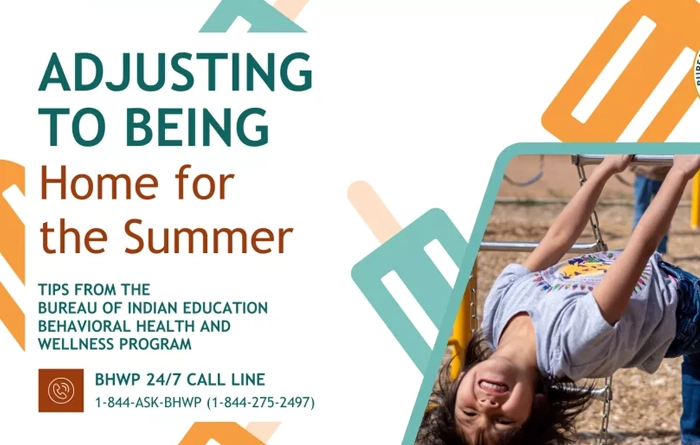How to Adjust to Being Home for the Summer
Announcements

At the end of the school year, the transition to spending all your time at home during summer break can affect you emotionally, academically and physically. The Bureau of Indian Education Behavioral Health and Wellness Program has some tips to help with this transition:
- Set Expectations: It’s never too late to think about what might be expected of you at home. This can include chores, curfews, social activities, and more. Consider what you need to do to meet these expectations and make a plan.
- Give Yourself Time to Adjust: Moving from a structured school environment to one with more freedom takes time. Allow yourself to get used to the change. Adjusting to new routines and environments requires practice.
Set Small Goals: If the transition feels overwhelming, break it down into smaller steps. Small wins can add up and provide a sense of purpose. Create a list of achievable daily goals, such as reading a chapter of a book, folding laundry, or going for a run.
Stay Engaged in Your Interests: You may have developed new hobbies or interests at school. Continue doing activities that bring you joy. Keep practicing the guitar, perfecting your spiral throw, or working on your next beading project.
- Practice Self-Care: Take care of your mind and body, especially when you feel overwhelmed. Simple activities like getting outside, enjoying fresh air, and exercising can help you stay grounded. Learn a new breathing exercise or participate in a community ceremony.
- Continue Studying: Visit your local library for books or documentaries on your favorite academic subjects to expand your knowledge. Start a journal to capture your thoughts and questions about what you have learned.
Accept Your Emotions: Remind yourself that your feelings are valid and deserve to be heard.
Set Boundaries with Family Members: These boundaries can help keep you and the relationship safe.
Seek Support from Outside Sources: Talk to someone when you need to about your struggles and success or for guidance, whether they are a trusted friend or a trained professional.
The Behavioral Health and Wellness Program’s 24/7 Call Line is available to students and staff, even throughout the summer. If you need someone to talk to about the transition, BHWP has trained behavioral health specialists ready to help. Call 1-844-ASK-BHWP (1-844-275-2497) and select Option 1 to learn more and connect with someone.



